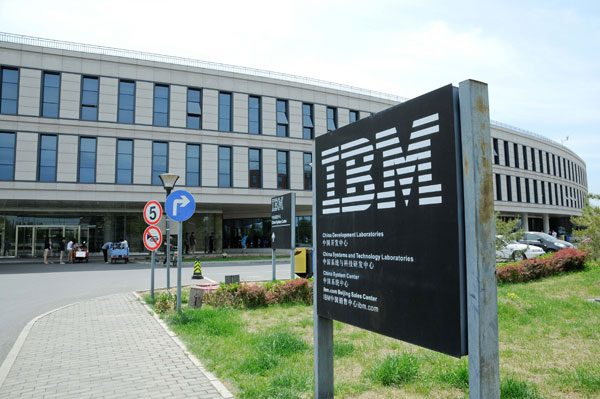
Interpreting information for commercial use will become huge business
Chinese companies will need more advanced technology to process their increasing amount of unstructured data as they enter into global competition, said Ernie Hu, global vice-president and director of the software group at IBM Greater China.
|
 |
|
The IBM logo in front of a building in the Zhongguancun Science and Technology Park in Beijing. The company is expecting to help banks, hospitals and telecom carriers to explore the value of company data next year. Provided to China Daily |
The county's big data market is yet to develop but it will take only a few years before it grows into an immense market, said Hu.
The turnover of the nation's big data processing business is likely to hit 310 million yuan ($49.6 million) this year, according to An Hui, director at the Software and Information Service Research Institute of CCID Group, a think tank under the Ministry of Industry and Information Technology.
Big data is a collection of data that is too large and too complex for traditional management tools to process. The challenges include data capture, storage, search, analysis, as well as visualization.
Although the adoption rate of big data processing technology remains low, China will become one of the biggest markets for it in coming years, said An, adding that the turnover could hit 5 billion yuan by 2016.
Chinese companies that are keen to become the global leader in research and development in their own industries will need to adopt big data technology to better analyze market statistics, said Hu.
The R&D leaders in each industry will be IBM's priority targets in the big data sector because of resource limitations in the service and finance areas, he said.
Currently, IBM's big data customers are in industries such as the financial services, medicine and telecommunications.
Although Hu suggested that a lot more work needs to be done to help banks, hospitals and telecom carriers to explore the value of company data, the biggest challenge for most of the big data solution providers remains to be how to lure customers in other industries to adopt this new technology.
Smart City, a government-backed program aiming to digitalize community services and information such as bus timetables, is a perfect platform to push the idea of big data to the public, An suggested.
Researchers estimated there will be 600 to 800 cities in China adopting the Smart City program during the nation's 12th Five-Year Plan period (2011-15).
Municipal governments, intelligent transportation and closed-circuit television systems will need more big data management tools to analyze statistics.
Electronic-commerce websites are also likely to embrace big data in the coming year.
Online retailers such as Taobao will have to process at least 50 terabytes of data every day, an amount large enough to fill more than 2,000 Blu-ray disks. "In these areas, the demand for a big data solution is urgent," said An.
However, the ability to process data is only the first step for solution providers. The future of big data lies in making analysis tools think in the same way humans do.
"Installing artificial intelligence features to data analysis tools will enable the machines to explore the logic and hidden meanings beneath numbers. It is the ultimate goal of the industry," said An.
In October, Intel Corp's Vice-President Arvind Sodhani predicted that voice-control will be the big trend for the entire information technology industry. Global companies, including Intel and Apple Inc are developing their own cognitive computing softwares.
IBM thinks it is lifting the bar to a higher standard.
In 2011, IBM released Watson, a cognitive computing program that combines natural language processing, machine learning and hypothesis evaluation.
Watson was IBM's latest trial of artificial intelligence since the famous chess-playing computer Deep Blue. The company is putting Watson into commercial use.
"We see cognitive computing as a way to explore the added value of data. We will use it to better service our customers," said Hu.
gaoyuan@chinadaily.com.cn